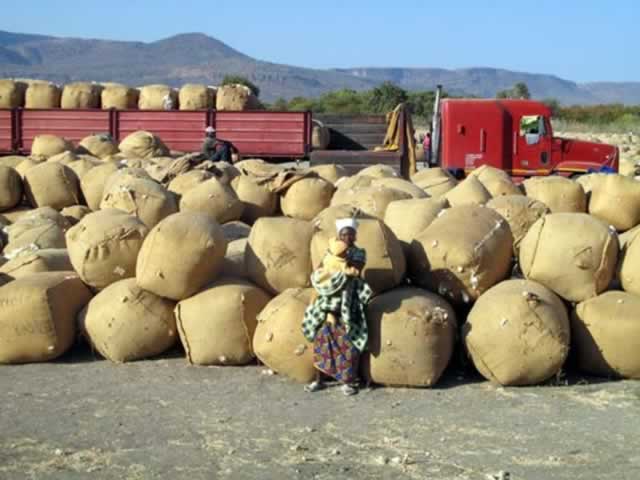Black days for traders . . . as ‘white gold’ rusts


DOUBLE BLOW . . . Uneconomic prices being offered by cotton buyers have hit farmers and informal traders who depend on them
Conrad Gweru Correspondent
Informal traders are increasingly becoming nomadic.
Many traders from Harare move from one place to another across the country, mainly following large events and other booms looking for rich pickings.
Illegal mining areas – the most prominent of which was the Chiadzwa diamond rush in 2006 /7 – tobacco auction floors, the Zimbabwe International Trade Fair, the Harare Agricultural Show have all presented informal traders with opportunities to make money.
However, one of the traditional hunting grounds for informal traders, cotton farming areas, is fast becoming decimated owing to the dip in cotton prices in recent years.
Areas such as Gokwe, Chegutu, Kadoma, Sanyati, Mt Darwin and Muzarabani, among others, are in the throes of the cotton recession, which has not only spelt doom for locals but traders who would cash in on the selling season, which is already underway.
At Mutora, a dusty business centre located in Gokwe North, a few people look busy.
Farmers in the nearby fields are seen harvesting their cotton while a few others are seen taking their produce to the nearest selling point.
Far from the growth point, some enterprising individuals from as far as Harare are already waiting for their kill as they are seen setting up makeshift stores.
The more serious ones are renting underutilised premises at key selling points where electrical goods such as radio sets, multi-purpose DVD players, clothes, baby wear, solar panels are sold. The situation replicates itself at Chitekete and Gokwe Centre, the major cotton trading centres.
June usually marks an exciting month for everyone when the sale of cotton gathers pace, but this year, like in recent times, the picture is different, gloomy even.
Over the years, the number of cotton farmers has been slowly declining, and so are the numbers of young people employed by the cotton ginners, a situation that has rendered many households vulnerable.
Many are still holding on to their produce this season protesting the gazetted price and at the same time, as a tactic for negotiating a better selling price.
Nimrod Maphosa, a Harare-based trader, was yet to realise any sales at the time The Herald visited his makeshift store which specializes in electrical goods and clothing.
“I have been here for more than a week and I have not sold anything. The season is just different from many others. Although the price was not so attractive, 2013 was much better.
“Farmers expected a better price this season hence the idea of holding on to their produce. I cannot leave now, I have to wait and see if there will be any improvements.”
Gift Mdala added: “I sell electrical goods and clothes and very few are interested in buying them, at least for now. Those that have sold their produce prefer buying food and school uniforms. No one is into luxury goods yet.
“I have picked out that those that are selling produce are only doing so because of financial problems but they are not selling all they have, one or two bales maybe to meet their immediate needs. I am planning to bring a few food items from Harare to supplement what I have so far.”
Another trader, Godfrey Chikwaya, reckons this year might be worse.
“Farmers enjoyed a better price in 2011 as a kilogramme of cotton was selling for US$1. Since then, there has been disgruntlement from farmers as prices fall to unexpected levels. Over the years, we have been enjoying business as farmers would bring their produce, although under protest.
“This year is different because farmers are holding on to their produce and we never expected that. Our goods are not selling as fast as we expected. I have been making a living out of this since 2006.
“We have been bringing convenience to the farmer who would avoid getting into towns to make purchases. Everything they want we provide at competitive prices,” he said.
Nomsa Ncube has been selling wares to farmers since 2008.
“I have supported my children and they never missed school due to unpaid fees,” she said.
“At the moment we do not know what is going to happen between the Government, farmers and the buyers. We are only here to provide the much needed basics which most of them struggle to access.
“As you have seen, the roads here are so bad and very few business people want to come and set bases at the periphery. Our nature of business is appreciated by many who benefit from our services. Even though it is difficult to get here, every year farmers encourage us to come back.”
Several traders are caught in between, with a number of them yet to make a decision either to go back or stay until the pricing issue is resolved.
“It is very difficult for me to say. At times I tell myself that I will be going back to Gweru the following day but it is the hope of a better day that keeps me waiting. A lot of rumours are told, we hear of a possible increase in the kilogramme price of cotton.
“If I go back I will not be able to come back because it will be very expensive to do so. The best alternative will be to sell for a small profit to recover costs but that is only possible when farmers bring their produce for sell, otherwise we are hopeless for now”, said Ruvimbo Moyo, a trader from Gweru.
The “oldest profession” is suffering too.
Booking houses used to be flush with clients during this time, day and night.
“Business is not looking good this time around but hopefully it will improve when the pricing issue is resolved,” said one owner of a lodge.
Equally affected are the young people from Gokwe who are usually employed by the cotton ginners.
Gift Mdala, an extension officer with Olam, operating at an area called Madhamu in Gokwe, pointed out that farmers were still holding on to their produce in anticipation of an increase in the selling price.
“Farmers are still holding on to their produce. By this time last year, we were already at our selling peak. There has been speculation that the price could be increased to US0,65 cents but it still remains a rumour. As you can see, we are just here waiting for a few farmers who are bringing in their produce.”
Uncertainty hangs over the marketing of cotton in the country as farmers, most of them from the rural areas, are feeling hard done by the pricing regimes that are being controlled by buyers.
Traditionally, farmers unions would negotiate for a producer price on behalf of the farmers but cotton buyers recently approached the courts to bar the unions from negotiating the prices.
The buyers argued that they should be allowed to negotiate with individual farmers.
The courts acceded to the demand, leaving poor rural farmers at the mercy of buyers.
To further complicate matters for the farmers, buyers have formed cartels and contractors bar farmers from side marketing.
The only resort of the farmers is to hold on to their crop, and pray for the better.
The stratagem has not been effective and farmers end up selling their crop, anyway, so as to make ends meet.
Feedback: [email protected]









Comments